27 start with O start with O
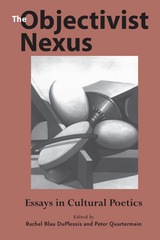
"Objectivist" writers, conjoined through a variety of personal, ideological, and literary-historical links, have, from the late 1920s to the present, attracted emulation and suspicion. Representing a nonsymbolist, postimagist poetics and characterized by a historical, realist, antimythological worldview, Objectivists have retained their outsider status. Despite such status, however, the formal, intellectual, ideological, and ethical concerns of the Objectivist nexus have increasingly influenced poetry and poetics in the United States.
Thus, argue editors Rachel Blau DuPlessis and Peter Quartermain, the time has come for an anthology that unites essential works on Objectivist practices and presents Objectivist writing as an enlargement of the possibilities of poetry rather than as a determinable and definable literary movement. The authors' collective aim is to bring attention to this group of poets and to exemplify and specify cultural readings for poetic texts--readings alert to the material world, politics, society, and history, and readings concerned with the production, dissemination, and reception of poetic texts.
The contributors consider Basil Bunting, Lorine Niedecker, George Oppen, Carl Rakosi, Charles Reznikoff, and Louis Zukofsky within both their historical milieu and our own. The essays insist on poetry as a mode of thought; analyze and evaluate Objectivist politics; focus on the ethical, spiritual, and religious issues raised by certain Objectivist affiliations with Judaism; and explore the dissemination of poetic texts and the vagaries of Objectivist reception. Running throughout the book are two related threads: Objectivist writing as generally a practice aware of its own historical and social contingency and Objectivist writing as a site of complexity, contestation, interrogation, and disagreement.
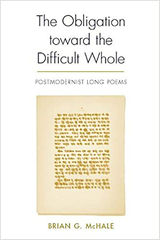
Addressing subjects as wide-ranging as angelology, the court masque, pop art, caricature, the cult of the ruin, hip-hop, Spense’'s Irish policy, and the aesthetics of silence, Brian McHale pulls varied threads together to identify a repertoire of postmodernist elements characteristic of the long poems he examines.
As critic Jed Rasula explains, “McHale is wonderfully resourceful in changing the subject from chapter to chapter to fit the poems discussed, and while his approach adheres to the conventions of textual exegesis, the chapters really shine as orchestrations of issues. For instance, James Merrill’s The Changing Light at Sandover works unexpectedly well in raising the subject of found poetry and procedural composition; Melvin Tolso’'s Harlem Gallery and Edward Dorn's Gunslinger are effectively paired to demonstrate the period flavor of pastiche; Geoffrey Hill’s Mercian Hymns and Armand Schwerner’s The Tablets explode the modernist fixation with depth; John Ashbery’s work is given a nuanced reading as proto-theory; Letter to an Imaginary Friend by Thomas McGrath provides a lucid backdrop to raise the question of political efficacy in approaching language poet Bruce Andrews; and Susan Howe's The Europe of Trusts is explored for its intertextual tapestry.”
McHale shows how elements from these long poems overlap, interfere, pull in different directions, jar against, and even contradict each other; and he demonstrates how they also echo, amplify, and reinforce each other. They do not slot smoothly together like pieces in a jigsaw puzzle, but they do form (what else?) a difficult whole.
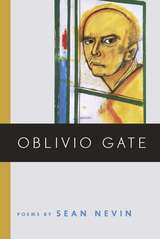
Suffused with lyrical grace and the language of loss, Sean Nevin's Oblivio Gate explores the mental and emotional struggles of Solomon, a veteran battling the onslaught of Alzheimer's disease. Set against Solomon's memories of the Korean War, Nevin's poems draw us into an intimate view of a man's confusion as everything he knows slowly unravels around him, leaving him abandoned in the suddenly unfamiliar landscape of his own mind. Readers experience first- hand Solomon's dismay as he watches himself inexorably slip away from reality, fighting to hold on to the shreds of his identity. Intertwined with his perspective are the voices of loved ones and caregivers who can only watch helplessly as Solomon is ravaged by the illness. Also central to the collection are the figures of Aurora and Tithonus, the famously doomed couple of mythology whose own happiness was destroyed by the inevitability of age and the betrayal of the body. But if this evocative portrait of Alzheimer's disease is tragic, it is also at moments inspiring.
Oblivio Gate reveals not only what is lost, but also what is found, what is pure, and even what is funny in our fleeting lives. Ultimately, Sean Nevin crafts an unforgettable collection of contemporary poetry that yields heartbreaking insight into memory, the mind, and an affliction that has left millions lost and looking for themselves.

The emergence of a master artist alongside his first major collection, created during a golden age of art in the nation’s capital
Renowned for his innovative work with silkscreen printing, Lou Stovall’s works are part of numerous collections, including the National Gallery of Art, Smithsonian American Art Museum, and Phillips Collection. Washington Post art critic Paul Richard once wrote, “As a printer of his own art, and of the art of many others, as a framer and installer and shepherd of collections, Stovall has inserted more art into Washington than almost anyone in town.”
Of the Land: The Art and Poetry of Lou Stovall presents a series of prints and accompanying poems that showcase the artist’s work during the 1970s, when he was developing his unique silkscreen technique and exploring both natural and abstract elements. An introduction by the book’s editor and artist’s son, Will Stovall, along with an autobiography from the artist anchor the Of the Land series in its time and place—a period of jazz, protest, and prolific art production in Washington, DC, that birthed the Washington Color School. Stovall’s contributions, as well as his collaborations with well-known artists like Jacob Lawrence, Sam Gilliam, Elizabeth Catlett, and Robert Mangold, have cemented him as one of the most significant American artists of our age.
Part of a tradition of African American artists and thinkers who met at Howard University, Lou Stovall created the Workshop in 1968, a small, active silkscreen studio printing posters for arts and DC-focused events. His deep influence on the silkscreen medium, the art community, and DC will be part of his lasting legacy.
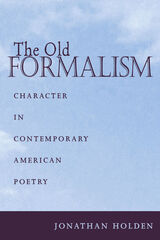
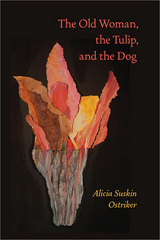
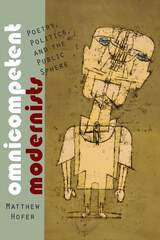
“It is difficult / to get the news from poems / yet men die miserably every day / for lack / of what is found there,” as the poet William Carlos Williams memorably declared. In Omnicompetent Modernists: Poetry, Politics, and the Public Sphere, Matthew Hofer examines, through a multilayered literary critique of interwar modernist poetry, what it might mean to get the news, and more, from a poet.
Using pragmatist ideas about the public sphere as a tool, Hofer reveals how Langston Hughes, Ezra Pound, and Mina Loy sought to use literature to both express and enable thought. In Hughes, Pound, and Loy, Hofer attends to poets whose work vigorously imagined possible new relationships between language, thinking, and public society. Each poet had different goals and used different methods, but all found both inspiration and encouragement in popular political theory. Hughes advocated for a more just vision of color and class in the United States. Pound sought to condemn those whom he associated with public harm, linguistically, socially, economically, and politically. Loy championed the “psycho-democratic” representation of women, in both public and private life.
Although Hughes, Pound, and Loy are rarely considered together, what unites these three writers is how each reconceived the public realm, and revolutionized aesthetic form to articulate those visions. Hofer combines sharp intellectual historiography with rigorous literary criticism and the result is a study that reinvigorates both the poems and poets under consideration and speaks to the immense power of language in manipulating public opinion—with pertinent implications for the politics of the present.
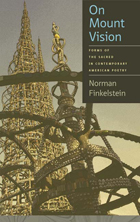
Plumbing what the poet Michael Palmer calls “the dimension of the Spirit, with that troublesome, rebarbative capital letter,” Norman Finkelstein’s On Mount Vision asks how and why the sacred has remained a basic concern of contemporary experimental poets in our secular age. By charting the wandering, together and apart, of poetry and belief, Finkelstein illustrates the rich tapestry formed by the warp and woof of poetry, and the play of Gnosticism, antinomianism, spiritualism, and shamanism, which have commonly been regarded as heretical and sometimes been outright suppressed.
This beautifully written work begins with an overview of the spiritual problematics found in nineteenth- and early twentieth-century American poetry. Traveling slightly outside of the realm of the contemporary, Finkelstein’s discussions of Emerson, Whitman, and Eliot yield to close readings of the works of Robert Duncan, Jack Spicer, Ronald Johnson, Michael Palmer, Susan Howe, Nathaniel Mackey, and Armand Schwerner. In restoring verse to its place alongside scripture, Finkelstein reminds us why the sacred remains crucial to our understanding of postmodern American poetry.
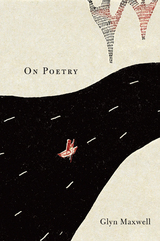
“This is a book for anyone,” Glyn Maxwell declares of On Poetry. A guide to the writing of poetry and a defense of the art, it will be especially prized by writers and readers who wish to understand why and how poetic technique matters. When Maxwell states, “With rhyme what matters is the distance between rhymes” or “the line-break is punctuation,” he compresses into simple, memorable phrases a great deal of practical wisdom.
In seven chapters whose weird, gnomic titles announce the singularity of the book—“White,” “Black,” “Form,” “Pulse,” “Chime,” “Space,” and “Time”—the poet explores his belief that the greatest verse arises from a harmony of mind and body, and that poetic forms originate in human necessities: breath, heartbeat, footstep, posture. “The sound of form in poetry descended from song, molded by breath, is the sound of that creature yearning to leave a mark. The meter says tick-tock. The rhyme says remember. The whiteness says alone,” Maxwell writes. To illustrate his argument, he draws upon personal touchstones such as Emily Dickinson and Robert Frost. An experienced teacher, Maxwell also takes us inside the world of the creative writing class, where we learn from the experiences of four aspiring poets.
“You master form you master time,” Maxwell says. In this guide to the most ancient and sublime of the realms of literature, Maxwell shares his mastery with us.
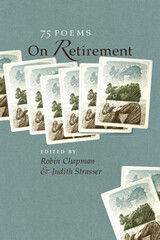
This superb collection includes poems by men and women ranging in age from their fifties to their eighties and hailing from different cities, regions, and countries. The entire range of emotions and literary perspectives is represented here, whether the specter of death in Doug Anderson’s “Sixty One” or a sly grin in Roger Pfingston’s “Retired.”
Each poet—whether retired or just contemplating retirement—greets the prospect of this new chapter of life differently. George Bilgere purchases the complete works of Verdi and extravagant silk shirts, while Denise Levertov contemplates life alone. Alicia Ostriker implores readers to “keep on fighting, keep up the good work,” and Alberto Ríos recalls a lost love. However we contemplate retirement, this volume will illuminate the careful thoughts of those who have faced these questions before us.
Contributors Include:
Werner Aspenstrom, Chana Bloch, Philip Booth, Hayden Carruth, Lucille Clifton, Ruth Daigon, Susan Elbe, Sam Hamill, Mark Irwin, klipschutz, Ted Kooser, Maxine Kumin, Richard Moore, Naomi Shihab Nye, Grace Paley, Robert Pinsky, Carol Potter, Ishmael Reed, Claudette Mork Sigg, Ronald Wallace

Beyond Lionel Trilling's classic definition of Modernism as anticultural and subversive, Margaret Dickie posits American Modernist poetry as both conservative and affirmative—conservative because it was dominated by the composition of the long poem, affirmative because these poems aimed to restore public themes to poetry, to instruct and improve, to "affirm the gold thread in the pattern," as Ezra Pound claimed.
Each poet discussed in this new study—T. S. Eliot, Hart Crane, William Carlos Williams, and Ezra Pound—began his career as an experimenter in brief lyrics and then, paradoxically, developed an ambition to write a long public poem. The poems they wrote—The Waste Land, The Bridge, Paterson, and The Cantos—differed in length, in program, and in composition, but all were alike in their idealization of form, their commitment to the long poem, and the troubled and difficult process of their composition. Read together, they offer a new understanding of the Modernist sense of form shared by these quite different writers.
Tracing the development of each poem from the poet's initial announced plans through the lengthy writing and reconsideration of purpose, Dickie offers a new history not only of each poem but of the American Modernists and the ways they adapted the avant-garde tendencies of European Modernism to their own native needs.
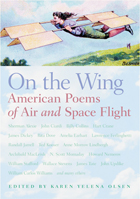
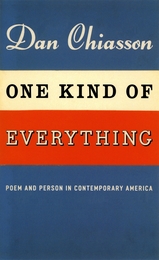
One Kind of Everything elucidates the uses of autobiography and constructions of personhood in American poetry since World War II, with helpful reference to American literature in general since Emerson. Taking on one of the most crucial issues in American poetry of the last fifty years, celebrated poet Dan Chiasson explores what is lost or gained when real-life experiences are made part of the subject matter and source material for poetry. In five extended, scholarly essays—on Robert Lowell, Elizabeth Bishop, Frank Bidart, Frank O’Hara, and Louise Glück—Chiasson looks specifically to bridge the chasm between formal and experimental poetry in the United States. Regardless of form, Chiasson argues that recent American poetry is most thoughtful when it engages most forcefully with autobiographical material, either in an effort to embrace it or denounce it.
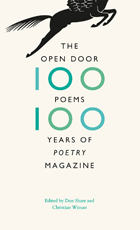
When Harriet Monroe founded Poetry magazine in Chicago in 1912, she began with an image: the Open Door. “May the great poet we are looking for never find it shut, or half-shut, against his ample genius!” For a century, the most important and enduring poets have walked through that door—William Carlos Williams and Wallace Stevens in its first years, Rae Armantrout and Kay Ryan in 2011. And at the same time, Poetry continues to discover the new voices who will be read a century from now.
Poetry’s archives are incomparable, and to celebrate the magazine’s centennial, editors Don Share and Christian Wiman combed them to create a new kind of anthology, energized by the self-imposed limitation to one hundred poems. Rather than attempting to be exhaustive or definitive—or even to offer the most familiar works—they have assembled a collection of poems that, in their juxtaposition, echo across a century of poetry. Adrienne Rich appears alongside Charles Bukowski; poems by Isaac Rosenberg and Randall Jarrell on the two world wars flank a devastating Vietnam War poem by the lesser-known George Starbuck; August Kleinzahler’s “The Hereafter” precedes “Prufrock,” casting Eliot’s masterpiece in a new light. Short extracts from Poetry’s letters and criticism punctuate the verse selections, hinting at themes and threads and serving as guides, interlocutors, or dissenting voices.
The resulting volume is an anthology like no other, a celebration of idiosyncrasy and invention, a vital monument to an institution that refuses to be static, and, most of all, a book that lovers of poetry will devour, debate, and keep close at hand.
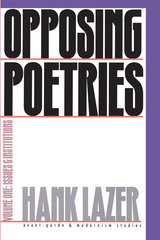
Volume One examines the shift in the governing assumptions of contemporary poetic practice. Lazer inspects the key critical works addressing poetries in the 1980s and 1990s, as well as the political and aesthetic impact of modern critics, poetry reading programs, and of the publishing industry and libraries on contemporary poetic practice.
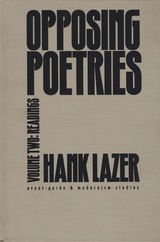
In Volume Two, Lazer presents a series of sustained readings of important experimental texts. Included are the poets Susan Howe, Lyn Hejinian, Bruce Andrews, and James Sherry. Lazer places these poets in the context of contemporary literary theory, and inspects both the successes and failures of said theory to interpret these works.

British America's poetry of empire was dominated by three issues: mercantilism's promise that civilization and wealth would be transmitted from London to the provinces; the debate over the extent of metropolitan prerogatives in law and commerce when they obtruded upon provincial rights and interests; and the argument that Britain's imperium pelagi was an ethical empire, because it depended upon the morality of trade, while the empires of Spain and France were immoral empires because they were grounded upon conquest. In discussing these issues, Shields provides a virtual anthology of poems long lost to students of American literature.
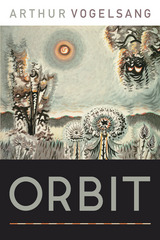
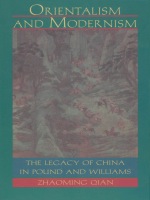
Consulting rare and unpublished materials, Qian traces Pound’s and Williams’s remarkable dialogues with the great Chinese poets—Qu Yuan, Li Bo, Wang Wei, and Bo Juyi—between 1913 and 1923. His investigation reveals that these exchanges contributed more than topical and thematic ideas to the Americans’ work and suggests that their progressively modernist style is directly linked to a steadily growing contact and affinity for similar Chinese styles. He demonstrates, for example, how such influences as the ethics of pictorial representation, the style of ellipsis, allusion, and juxtaposition, and the Taoist/Zen–Buddhist notion of nonbeing/being made their way into Pound’s pre-Fenollosan Chinese adaptations, Cathay, Lustra, and the Early Cantos, as well as Williams’s Sour Grapes and Spring and All. Developing a new interpretation of important work by Pound and Williams, Orientalism and Modernism fills a significant gap in accounts of American Modernism, which can be seen here for the first time in its truly multicultural character.
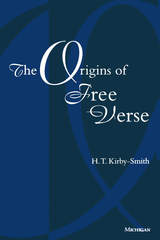
Though free verse became a dominant poetic mode only in the twentieth century, Kirby-Smith finds its roots in seventeenth-century England. Beginning his study with writers such as John Milton--who was considered by T. S. Eliot to be the greatest writer of free verse in English--the author places recent and divisive topics in poetics in context, showing them to be attenuated remnants of issues first broached hundreds of years ago.
The book seeks to establish a consensus on the nature of free verse, with reference to critics and poets including Pound, Eliot, Williams, Amy Lowell, Yvor Winters, and Hugh Kenner. Good free verse, argues Kirby-Smith, arises as a reaction to a well-established set of conventions. Likewise, The Origins of Free Verse goes against the conventions of existing poetic scholarship, offering an encompassing yet fresh--and controversial--literary history of free verse.
"At moments, this study is revelatory. . . . In its range and detail it offers a way of thinking about the history of English-language prosody which recognizes the importance of the poet's individual choices and undercuts our century's vanity. . . . Poetry is a learned art, and Kirby-Smith brings both insight and much learning to reading it." --Times Literary Supplement
"The best study of free verse I have seen. . . . The Origins of Free Verse is a book that all students of prosody will want to read. " --Harvard Review
". . . a witty and polemical account of the emergence and development of free verse." --Choice
H. T. Kirby-Smith is Professor of English, University of North Carolina at Greensboro.
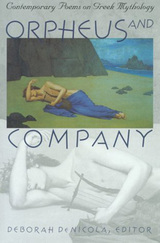
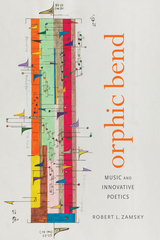
WINNER OF THE ELIZABETH AGEE PRIZE IN AMERICAN LITERATURE
Orphic Bend: Music and Innovative Poetics explores the impact of music on recent pioneering literary practices in the United States. Adopting the myth of Orpheus as its framework, Robert L. Zamsky argues that works by Charles Bernstein, Robert Creeley, John Taggart, Tracie Morris, and Nathaniel Mackey restage ancient debates over the relationship between poetry and music even as they develop work that often sharply diverges from traditional literary forms. Opening each chapter with a consideration of the orphic roots of lyric, Zamsky integrates contemporary debates over the prospects and limitations of humanism, the meaningfulness of gesture and performance, and the nature of knowledge with the poetics of the writers under consideration, grounding his analysis in close readings of their work.
The myth of Orpheus is used as a lens throughout the book, its different facets illuminating sometimes dramatically different aspects of the shared framework of poetry and music. In the case of Bernstein, for instance, Zamsky highlights Ezra Pound’s meditations on the relationship between poetry and music (the ground upon which Pound seeks to recapture the lost possibilities of the Renaissance) and Bernstein’s incisive critique of Pound. For her part, Morris emphasizes the performative power of spoken language, foregrounding the fact that all spoken language bears cultural, communal, and personal marks of the speaker, improving an ensemble self even within the most elemental features of language. Meanwhile, in Mackey’s work, the orphic voice of the poet powerfully reaches toward an order of knowledge in which poetry and music are nearly indecipherable from one another. In this sense, music and the musicality of poetic language are the gateways for Mackey’s Gnosticism, the mechanisms of initiation into a realm, not of secrets to be learned, but of visionary knowing that continuously unfolds.
The text explores a range of musical influences on the writers under consideration, from opera to different iterations of jazz, and underscores the variety of ways in which music informs their work. Many of these writers effectively present a theory of music in their invocations of it as an inspiration for, or as an analog to, poetic practice. Zamsky’s focus on poetry and music echoes important interdisciplinary studies on literary modernism, a period for which the importance of music to literary practice is well established and extends that discussion to the contemporary context. In doing so, Orphic Bend provides an important opportunity to consider both the specific legacy of modernism, and to situate contemporary writers in broader historical contexts.
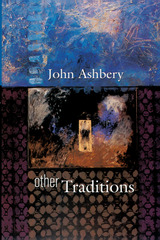
One of the greatest living poets in English here explores the work of six writers he often finds himself reading "in order to get started" when writing, poets he turns to as "a poetic jump-start for times when the batteries have run down." Among those whom John Ashbery reads at such times are John Clare, Thomas Lovell Beddoes, Raymond Roussel, John Wheelwright, Laura Riding, and David Schubert. Less familiar than some, under Ashbery's scrutiny these poets emerge as the powerful but private and somewhat wild voices whose eccentricity has kept them from the mainstream--and whose vision merits Ashbery's efforts, and our own, to read them well.
Deeply interesting in themselves, Ashbery's reflections on these poets of "another tradition" are equally intriguing for what they tell us about Ashbery's own way of reading, writing, and thinking. With its indirect clues to his work and its generous and infectious appreciation of a remarkable group of poets, this book conveys the passion, delight, curiosity, and insight that underlie the art and craft of poetry for writer and reader alike. Even as it invites us to discover the work of poets in Ashbery's other tradition, it reminds us of Ashbery's essential place in our own.
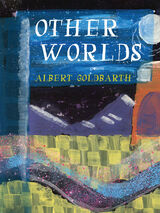
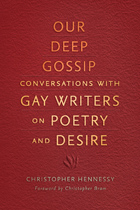
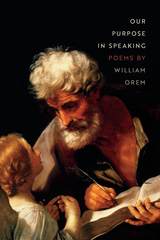
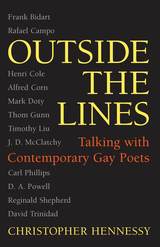
---Bernard Cooper, author of Maps to Anywhere
Editor Christopher Hennessy gathers interviews with some of the most significant figures in contemporary American poetry. While each poet is gay, these encompassing, craft-centered interviews reflect the diversity of their respective arts and serve as a testament to the impact gay poets have had and will continue to have on contemporary poetics.
The book includes twelve frank, intense interviews with some of America's best-known and loved poets, who have not only enjoyed wide critical acclaim but who have had lasting impact on both the gay tradition and the contemporary canon writ large, for example, Frank Bidart, the late Thom Gunn, and J. D. McClatchy. Some of the most honored and respected poets, still in the middle of their careers, are also included, for example, Mark Doty, Carl Phillips, and Reginald Shepherd. Each interview explores the poet's complete work to date, often illuminating the poet's technical evolution and emotional growth, probing shifts in theme, and even investigating links between verse and sexuality.
In addition to a selected bibliography of works by established poets, the book also includes a list of works by newer and emerging poets who are well on their way to becoming important voices of the new millennium.
READERS
Browse our collection.
PUBLISHERS
See BiblioVault's publisher services.
STUDENT SERVICES
Files for college accessibility offices.
UChicago Accessibility Resources
home | accessibility | search | about | contact us
BiblioVault ® 2001 - 2024
The University of Chicago Press









